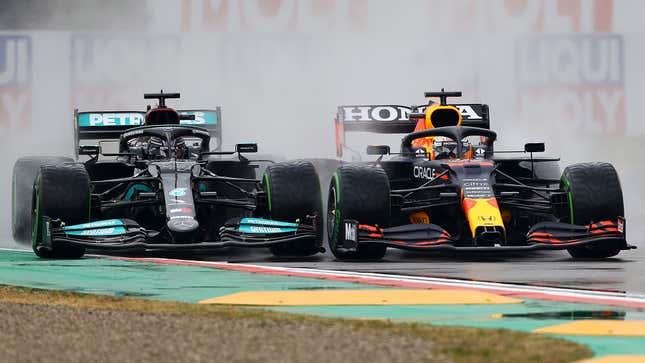
Honda’s Formula 1 development team didn’t need to try this year. The Japanese automaker announced it was leaving the sport, as well as its cooperation with Red Bull, last October. It was a surprising blow to a partnership that seemed to only blossom over the previous two seasons. Red Bull will do its best to pick up the pieces with a new powertrain effort of its own, ensuring all the progress Honda’s made won’t go for naught.
But Honda isn’t just phoning it in, not at all, and that much is already clear from Red Bull and sister team AlphaTauri’s performance in the first two races of the season. Max Verstappen’s car was the one to beat last weekend at Imola. Following that triumph, Honda’s head of power unit development, Yasuaki Asaki, took to a blog to explain all the hard work over the past six months that’s taken it and Red Bull to where they need to be right now.
The new power unit design that Red Bull and AlphaTauri have put into use was on, then off, then on again for this season. Honda originally decided against having it ready for the start of 2021 — until the company decided to pull out of Formula 1 at the end of the year. Asaki said that decision motivated the team to go out with a bang:
“The original plan was to implement this new structure PU this year in 2021,” Asaki-san explains. “But then for a variety of reasons, it was decided not to proceed with a brand new PU. However, the thinking on this really changed when Honda announced that we would be leaving the sport. I went to [former Honda] President [Takahiro] Hachigo, and said to him that we would really like to implement this new structure PU for our last year in the sport. And he kindly accepted that request.
Consider that the team also decided to take on this challenge in the context of a global pandemic. It’s actually the first time Honda reworked the structure of its power unit since it returned to F1 engine development in 2015.
“This is the first time that we’ve gone as far as changing the structure of the PU itself. But I think the biggest challenge that we’ve had up to this point was back in the McLaren days, when we made big changes to the MGU-H, we changed the positioning of the compressor and turbine in relation to the V bank — I think the biggest challenges were back then.
Given the way the relationship between McLaren and Honda exploded, I think I understand what Asaki is getting at there.
Most of the blog is spent explaining the engine’s major changes for 2021. One of the driving factors behind the need for a new structure was a desire to increase combustion efficiency. Altering one aspect had knock-on effects on the rest of the unit:
“First of all we’ve changed the camshaft layout to be much more compact, and also brought its position lower down so it’s closer to the ground,” Asaki-san reveals. “We’ve also had to change the valve angle. The main point of what we’ve changed was to improve combustion efficiency. In order to do so we had to change the valve angle and in order to do that we had to change the camshaft.”
The updates go much further. The head cover was redesigned for better airflow, the distance between bores was shortened to make the engine smaller, and the cylinder bank offset was been reversed to benefit packaging. The new power unit has a lower center of gravity. Thanks to all these improvements, Red Bull’s designers had more leeway to optimize the chassis how they wanted, without having to make compromises to suit Honda’s hardware.
I’ve abridged the nitty gritty details that Asaki covers in his interview, but it’s well worth reading, especially if you’re an engineering buff. While it’s unfortunate that Honda as a brand won’t continue to compete in F1 alongside Red Bull, a significant group of Honda’s personnel will move to Red Bull after 2021. Their focus will be on developing a power unit to comply with the sweeping new regulations set to take effect in 2025.